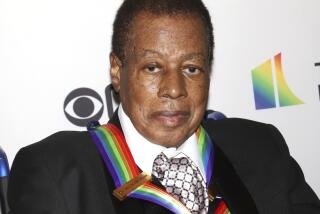RECORD REVIEW : Alumni Reunion a Milestone : *** HERBIE HANCOCK, WAYNE SHORTER, RON CARTER, TONY WILLIAMS, WALLACE RONEY : “Miles Davis Tribute” <i> Qwest</i>
- Share via
Was all the effort that went into this recording worth it? Well, yes and no. Yes, in that Davis’ elite mid-’60s rhythm section comes together surprisingly well, though in different fashion than when they cut such landmark discs as “E.S.P.,” “Miles Smiles” and “Nefertiti.” No, in that the cool camaraderie of the originals is lost, replaced instead by a glossed over give-and-take that succeeds on individual delivery rather than on group presentation. That Hancock, Shorter, Carter and Williams still find common ground for their now disparate styles makes this tribute something of a triumph.
The main reason for this success is the tunes themselves. Such lost classics as Carter’s “R.J.” and Shorter’s “Pinocchio” demonstrate how much Davis’ sound of the period owes to his sidemen’s compositions. When the group looks further back in time, as they do on “So What” and “All Blues,” the improvisations seem merely exercises, without the weight that the later pieces carry.
As individuals, Miles’ backing foursome has seldom sounded better. Shorter, long missing in action since the demise of Weather Report, is agile and gutsy on tenor, fleet and pointed on soprano. Carter’s bass rings with strong melodicism and Eastern-influenced double-stops on “Elegy,” while Hancock’s train-of-thought improvisations carry an almost visual quality. And Williams’ muscular embellishments and bass-drum onslaught makes even “So What” rock with to-the-beat certainty.
Still, the spotlight is on Roney and he delivers Davis’ spirit with uncanny clarity. While the trumpeter is often criticized for shadowing Miles too closely, here it’s just what the doctor ordered. In earlier efforts, both Wynton Marsalis and Freddie Hubbard failed to capture Davis’ essence when the same four Davis alumni were billed as the V.S.O.P. band. But Roney is eerily suited to the cause, right down to the practiced muffs and miscues that Davis turned into an art.
More to Read
The biggest entertainment stories
Get our big stories about Hollywood, film, television, music, arts, culture and more right in your inbox as soon as they publish.
You may occasionally receive promotional content from the Los Angeles Times.










